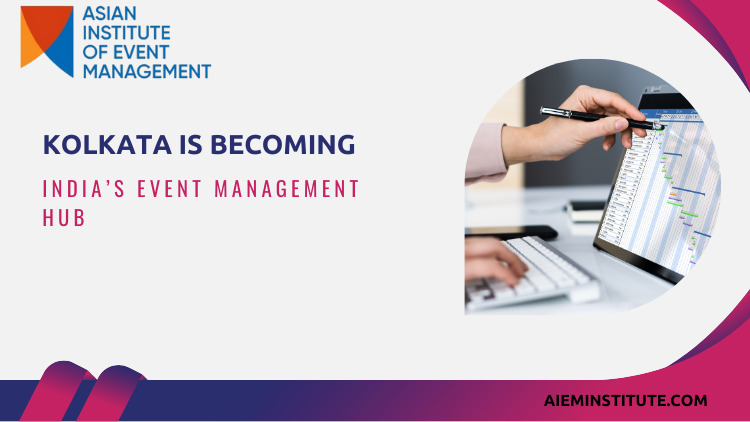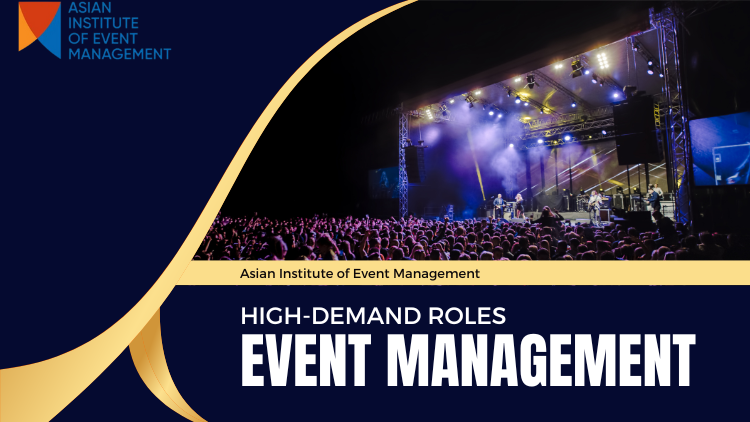
A Quick Guide To Build A Career In Event Management
January 12, 2024
If you find yourself daydreaming about decorations, catering logistics, and watching your creative visions unfold in real life, a career in event planning might be for you.
But it’s about way more than throwing a good party. Strategic planning, creative problem solving, managing budgets—it’s both glamorous and nitty-gritty behind the scenes.
In this quick guide, we’ll discuss the fundamentals you need to align with to build a successful career in event management.
Find a reputable event management institute
Selecting the right institute and program is a pivotal step in carving out a successful career in event management.
Practical, hands-on learning should be a top priority when choosing an institute. After all, event management thrives on real-world application, and an institute that offers extensive practical-based training will give you an edge.
The ideal institute is more than just about prestige. It’s where theory is seamlessly integrated with practical experiences, connections are built, and your career gains momentum.
Such institutes not only teach the fundamentals of event planning but also expose you to the real-world intricacies of the industry.
- For recent high school graduates, an undergraduate degree from an institute that provides immersive practical experiences, such as internships, can lay a solid foundation. This hands-on exposure is critical for understanding the industry and developing essential skills.
- Postgraduate programs are ideal for those with a basic understanding of the field and aim to specialize. These should also emphasize practical experiences, particularly in specialized areas like corporate events, wedding planning, or festival management.
- For working professionals seeking a shorter commitment or specific skill enhancement, look for diploma and certification courses that prioritize practical learning and long-term training programs. These courses should offer opportunities to work on real events, ensuring a deeper understanding of event technology and sustainable event management.
Ultimately, your choice should align with your career aspirations and the institute's ability to offer practical experiences, strong industry connections, and a supportive alum network.
Remember, the right program and institute combination is not just an educational choice. It's a career-defining decision that sets the tone for your future in the ever-evolving world of event management.
The Power of Networking in Event Management
Networking is the lifeblood of a successful career in event management. Building a strong network in this industry can open doors to unique opportunities and insights inaccessible through formal education alone.
This is where the right institute can play a crucial role.
A good event management program also helps you connect. It brings together like-minded individuals, industry veterans, and potential mentors. This network becomes a valuable resource for internships, job opportunities, and collaborative projects.
However, networking extends beyond the walls of the classroom. It involves actively participating in industry events, workshops, and seminars. It means connecting with professionals on platforms like LinkedIn, joining event management groups, and attending webinars.
The relationships you cultivate can lead to real-world opportunities, providing insights into the latest industry trends and practices.
Remember, in event management, your network can often directly reflect your career's growth trajectory. People you meet today might be your collaborators or clients tomorrow.
So, invest time in building these connections and nurturing them. Be open to learning from others and sharing your own experiences.
Cultivating Passion and Excellence in Event Management
To truly excel in your career, you need more than just technical skills—you need a genuine passion for what you do. This passion drives innovation and creativity, allowing you to design outstanding events.
Being good at your job also means staying updated with the latest trends and technologies in the industry. It’s about continually honing your skills and pushing the boundaries of what’s possible.
Whether it’s adopting new event technologies, exploring sustainable practices, or understanding the evolving preferences of clients and attendees, a commitment to learning and growth is essential.
Your dedication to being the best in your field will not go unnoticed. It’s what sets you apart and propels you up the career ladder. Employers and clients are always looking for individuals who have the necessary skills and bring a unique flair and unwavering enthusiasm to their work.
So, immerse yourself in your profession, seek feedback, and be open to new ideas.
Remember, in event management, your passion and pursuit of excellence are your most valuable assets.
Final Thoughts
The world of event management is filled with endless opportunities. Whether it’s orchestrating grand weddings, corporate conferences, or community events, each project brings its own set of challenges and rewards. The satisfaction of seeing your vision come to life and the joy of creating memorable experiences for others make all the hard work worthwhile.
As you start this journey, be strategic in positioning yourself for success. Choose an educational program designed to set you up for the career you want. Make connections with working professionals to gain real-world advice and insights. And never lose sight of the passion that drew you to this field. Success takes dedication through stress and long hours.
With the right mindset, skills, and network, you can turn event planning from just another job into a thriving, adventure-filled career. Keep pushing yourself to grow and learn with each event. And don't forget to have fun along the way!
RECENT POSTS
-

Navigating the Curriculum: Key Modules and Skills in an 11-Month Event Management Diploma
March 21, 2025
-

Maximizing Career Opportunities with an 11-Month Diploma in Event Management
February 20, 2025
-

Why Kolkata is Becoming India’s Event Management Hub
February 17, 2025
-

Top 5 High-Demand Roles in Event Management
February 12, 2025
-

What Elements Should Be Considered When Selecting the Best Event Management Institute?
January 6, 2025